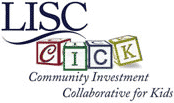
Vol. IV, No. 5, August/September 2005
- How young children perceive symbols in their environment
- The Children's Environmental Health Network
- The bigger the serving, the more children eat
- Childcare facilities' national loan resource update
- Richard Louv's Last Child in the Woods: Saving Our Children from Nature-Deficit Disorder
- Kresge Foundation funds 'green' childcare buildings
- Free classroom acoustic standards available
- 2006 Early Childhood Facilities Design Institute schedule
- Recent professional development
- Current projects
Childcare facilities' national loan resource update
![]() The
Low Income Housing Fund (LIHF) is one of the largest, most
productive, and most stable community development loans fund in the nation.
In 2002, LIHF brought approximately $100 million to the community development
agenda, with $80 million of its own assets and an additional $20 million
in capital administered to other institutions.
The
Low Income Housing Fund (LIHF) is one of the largest, most
productive, and most stable community development loans fund in the nation.
In 2002, LIHF brought approximately $100 million to the community development
agenda, with $80 million of its own assets and an additional $20 million
in capital administered to other institutions.
LIHF's focus is four-pronged: affordable housing, childcare, workforce development, and education. LIHF focuses on communities with the greatest need, using tools and programs that offer a real chance at economic independence. Over the years, LIHF has supported 38,000 units of affordable housing, 6,000 spaces of child care, 760 students in educational facilities, and over one million square feet of commercial space. While nearly all of LIHF's work benefits low income families, the vast majority -- 75 percent -- assists the very poor.
 The
Local Initiatives Support Corporation (LISC) is a national
non-profit organization that channels financial and technical resources
to community-based organizations to help them revitalize low-income neighborhoods.
Since its inception 20 years ago, LISC has raised more than $3
billion to help 1,700 community-based organizations build 100,000 new
affordable homes and create 11.2 million square feet of commercial and
community space. LISC's Community Investment Collaborative for
Kids (CICK, pronounced "kick") generates specialized
capital and technical support for the creation of child care facilities
in low-income communities across the country. To date, CICK has
stimulated more than $100 million in new investments in child care facilities
in 40 cities and rural areas around the country. CICK initiated
a public/private funding collaborative with the U.S. Department of
Health and Human Services and the U.S. Department of Agriculture
that provided a package of grants, loans, loan guarantees and technical
support for the development of Head Start and child care facilities in
rural communities in six states. In Connecticut, CICK worked with
public officials to craft the state's Child Care Facilities Financing
Program, which has led to the construction of 25 childcare centers
serving more than 3,000 low-income children. CICK has also secured
private funding to launch the Connecticut Children's Investment Partnership,
a statewide lending and technical assistance program for child care facilities
that complements the state's capital investment. A similar child care
facilities' initiative is being launched in Rhode Island.
The
Local Initiatives Support Corporation (LISC) is a national
non-profit organization that channels financial and technical resources
to community-based organizations to help them revitalize low-income neighborhoods.
Since its inception 20 years ago, LISC has raised more than $3
billion to help 1,700 community-based organizations build 100,000 new
affordable homes and create 11.2 million square feet of commercial and
community space. LISC's Community Investment Collaborative for
Kids (CICK, pronounced "kick") generates specialized
capital and technical support for the creation of child care facilities
in low-income communities across the country. To date, CICK has
stimulated more than $100 million in new investments in child care facilities
in 40 cities and rural areas around the country. CICK initiated
a public/private funding collaborative with the U.S. Department of
Health and Human Services and the U.S. Department of Agriculture
that provided a package of grants, loans, loan guarantees and technical
support for the development of Head Start and child care facilities in
rural communities in six states. In Connecticut, CICK worked with
public officials to craft the state's Child Care Facilities Financing
Program, which has led to the construction of 25 childcare centers
serving more than 3,000 low-income children. CICK has also secured
private funding to launch the Connecticut Children's Investment Partnership,
a statewide lending and technical assistance program for child care facilities
that complements the state's capital investment. A similar child care
facilities' initiative is being launched in Rhode Island.
More information can be found at www.liscnet.org.
Vol. IV, No. 5, August/September 2005
- How young children perceive symbols in their environment
- The Children's Environmental Health Network
- The bigger the serving, the more children eat
- Childcare facilities' national loan resource update
- Richard Louv's Last Child in the Woods: Saving Our Children from Nature-Deficit Disorder
- Kresge Foundation funds 'green' childcare buildings
- Free classroom acoustic standards available
- 2006 Early Childhood Facilities Design Institute schedule
- Recent professional development
- Current projects

